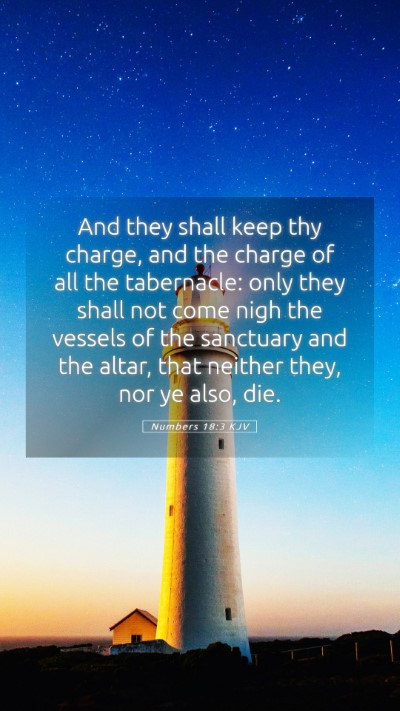Understanding Numbers 18:3 - A Comprehensive Exploration
Numbers 18:3 states: "And they shall keep your charge, and the charge of all the tabernacle: only they shall not come nigh the vessels of the sanctuary and the altar, that neither they, nor ye, die." This verse is part of a larger discourse on the responsibilities of the Levites and priests in relation to the tabernacle and its sacred aspects. Below is an exploration of the meaning behind this verse, drawing from public domain commentaries by Matthew Henry, Albert Barnes, and Adam Clarke.
Bible Verse Meanings and Interpretations
The significance of Numbers 18:3 can be analyzed from several angles:
1. The Role of the Levites
Matthew Henry's Commentary highlights the distinct role of the Levites in maintaining the sanctity of the tabernacle. They were set apart for service to ensure that the worship of God was carried out correctly and safely. This verse emphasizes that only those ordained (the Levites and priests) were permitted to approach the most sacred tasks of service, reflecting their unique covenant with God.
2. The Need for Holiness
Albert Barnes points out the ideal of holiness that is required when approaching sacred matters. The warning against approaching the sanctuary without proper authority serves as a reminder of the divine severity when dealing with holy things. This also underscores the importance of maintaining a respectful distance from the holy in order to preserve life.
3. Divine Authority and Accountability
Adam Clarke remarks on the hierarchical nature of the spiritual community in Israel, where Levites had specific duties. The acknowledgment of boundaries is crucial, as it establishes divine authority and human accountability. This structure ensures that God’s laws are respected, reflecting the seriousness with which Israel was to treat their covenant relationship with God.
Scripture Analysis and Biblical Exegesis
This verse invites deeper reflection on several theological principles:
- The Nature of Servanthood: The Levites exemplify what it means to serve the community in a sacred context. Their role is a foreshadowing of the New Testament understanding of ministerial priesthood.
- Understanding Sacred Space: The verse illustrates the concept of sacred spaces in worship. Just like in Numbers 18:3, New Testament believers have an obligation to honor the presence of God in their worship settings.
- Holy Fear: There is a prevalent theme of reverence throughout the Scripture, particularly when approaching that which is deemed holy. This dictates the attitude believers today must carry into worship.
Bible Study Insights and Lessons
The insights derived from Numbers 18:3 can be valuable for Bible study groups and personal reflections:
1. Application of Holiness
This verse teaches that holiness is not just about abstaining from sin but understanding the seriousness of our approach to God. All believers are called to approach God with the necessary reverence.
2. Importance of Structure in Worship
The structured approach to worship detailed in this passage reinforces the necessity of order within the church. This orderliness helps cultivate a worship environment that honors God.
3. Understanding Our Position Before God
Understanding the roles laid out in Numbers 18 can help believers comprehend their own roles in ministry today. This contextual understanding fosters a deeper appreciation for modern ecclesiastical structures.
Conclusion
In summary, Numbers 18:3 conveys profound truths regarding divine service, holiness, and the structure within spiritual leadership. It invites contemporary readers to reflect on how these principles apply in modern worship contexts and the ways in which we honor God's holiness today.
Related Cross-References
- Hebrews 5:1-4: Discusses the role of the high priest and the sanctity required in their position.
- Exodus 30:20-21: Clearly instructs that priests must wash before entering the tabernacle to avoid death.
- Leviticus 10:1-3: An example of the penalties for approaching sacred duties without the proper reverence.


